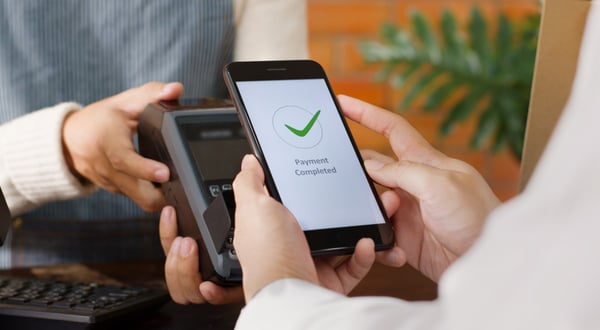Using Patient Education Videos to Support Preventive Care Strategies
As a healthcare provider, you know prevention saves lives. From routine screenings and lifestyle counseling to vaccinations and early detection,...
4 min read
Robert McDermott Apr 18, 2024 12:30:00 PM
 In 2003, more bills were paid via check than any other payment method. By 2012, that number plummeted, eclipsed by payment cards and ACH. This was the opening salvo in the move to cashless transactions. And now, we find ourselves, over a decade later, looking at nearly every business adopting mobile payments and digital wallets.
In 2003, more bills were paid via check than any other payment method. By 2012, that number plummeted, eclipsed by payment cards and ACH. This was the opening salvo in the move to cashless transactions. And now, we find ourselves, over a decade later, looking at nearly every business adopting mobile payments and digital wallets.
When it comes to healthcare payments, the benefits of mobile payment options and digital wallets are significant for both practices and patients alike. As these payments have largely overtaken traditional payment methods, it’s time for your healthcare practice to leverage the technology to help improve revenue cycle management while also enhancing the patient experience.
Quick Links:
Mobile payments and digital wallets have revolutionized the way we handle transactions in the digital age, offering convenience, security, and efficiency. Nearly every industry is leveraging these two payment methods for those reasons.
Mobile payments refer to the transactions made using a mobile device, such as a smartphone or tablet, to authorize the transfer of funds. These payments can occur through various channels, including mobile apps, QR codes, Near Field Communication (NFC) technology, like Apple Wallet and digital wallets, and SMS.
On the other hand, digital wallets, also known as e-wallets or mobile wallets, are digital versions of traditional wallets. They store payment card information, loyalty cards, gift cards, and even identification documents, securely, on mobile devices. Digital wallets facilitate seamless transactions, and mobile payments, by allowing users to simply tap their device, enter a secure PIN or use biometric authentication to complete a purchase.
The popularity of mobile payments and digital wallets has surged in recent years, driven by several factors. First, the widespread adoption of smartphones has made mobile payments accessible to a large portion of the population. Additionally, the convenience factor, enabling users to make purchases anytime, anywhere, without the need to carry physical cards or cash, has contributed to their popularity.
Moreover, the emphasis on contactless payments and hygiene during the COVID-19 pandemic further accelerated the adoption of mobile payments and digital wallets, as they offer a touch-free and secure alternative to traditional payment methods. Furthermore, the integration of advanced security features, such as tokenization and biometric authentication, has instilled confidence among consumers regarding the safety of their transactions. And, in turn, that pays off for businesses, including healthcare providers.
 The Rise of Mobile Payments and Digital Wallets in Healthcare
The Rise of Mobile Payments and Digital Wallets in HealthcareAs mentioned, healthcare is tapping into both mobile payments and digital wallets which is changing the way transactions are conducted. Mobile payment solutions offer convenience, security, and efficiency for both patients and healthcare providers.
To start, mobile payments and digital wallets allow patients to easily pay for all facets of medical service, from co-pays and out-of-pocket costs to prescriptions, using their smartphones, eliminating the need for cash or physical credit cards. Digital wallets, which securely store payment information, streamline the payment process and reduce the risk of fraud or identity theft.
Further, mobile payment platforms often integrate with healthcare apps, allowing patients to schedule appointments, access medical records, and receive reminders seamlessly. This integration enhances patient engagement and empowers individuals to take control of their health.
For healthcare providers, mobile payments offer faster payment processing, reduced administrative costs, and improved cash flow. By accepting digital payments, providers can also offer more flexible payment options to patients, leading to increased patient satisfaction and loyalty.
Overall, the rise of mobile payments and digital wallets for healthcare payments represents a significant step towards a more convenient, secure, and patient-centric healthcare system. However, ensuring the security and privacy of sensitive health information remains a critical consideration in the adoption and implementation of these technologies.
When it comes to data in the healthcare space, security is often at the forefront. With cyber attacks on healthcare continuing to rise, there are few components of the healthcare space that don’t face risks and threats.
While the digitalization of payment systems has brought unparalleled convenience and efficiency, ensuring the security of healthcare payments remains paramount.
One of the primary concerns surrounding digital healthcare payments is the safeguarding of sensitive patient information. With vast amounts of personal and financial data exchanged during transactions, healthcare providers must implement robust encryption protocols and data protection measures to prevent unauthorized access and breaches. Thankfully, leveraging the power of mobile payments and digital wallets means healthcare providers also have access to their robust security measures, keeping patient payments safe.
When it comes to payments, stringent compliance with regulatory standards, including both Payment Card Industry Data Security Standard (PCI-DSS) and HIPAA, is indispensable in maintaining the integrity of healthcare payment systems and ensuring the security of data, especially in transit.
Whereas HIPAA compliance mandates strict guidelines for the handling of protected health information (PHI), including financial data, PCI-DSS works to reduce payment card fraud by increasing security controls around cardholder data. The two, in conjunction, can help healthcare practices fortify their payment infrastructure against potential vulnerabilities and ensure compliance with regulatory requirements.
Clearly, one of the top benefits of digital healthcare payment is the enhanced security. However, as we’ve hinted, the benefits go well beyond enhanced payment security and include additional advantages for both providers and patients alike.
1. Convenience- Mobile payments and digital wallets streamline the payment process for both patients and providers. Patients can pay bills or copayments directly from their smartphones, reducing the need for manual processing or visits to physical payment locations.
2. Faster Payments- With mobile payments, healthcare providers can receive payments more quickly compared to traditional methods like checks. This can improve revenue cycle management, boost cash flow, and reduce the time and resources required for payment processing.
3. Reduced Administrative Costs- Digital payments reduce the need for manual data entry and reconciliation, cutting down on administrative overhead costs associated with billing and payment processing.
4. Improved Patient Experience- Offering mobile payment options enhances patient experience by providing a convenient and user-friendly way to manage healthcare expenses. Patients can easily view and pay bills from their mobile devices, leading to higher satisfaction levels.
5. Accessibility- Mobile payments can be made anytime, anywhere, making it easier for patients to manage their healthcare finances, even when they are on the go or traveling.
6. Integration with Electronic Health Records (EHR)- Some digital payment solutions can integrate directly with healthcare provider systems, including EHR systems, streamlining the billing and payment process further and reducing errors.
7. Cost Savings- Implementing mobile payments and digital wallets can ultimately result in cost savings for healthcare providers by reducing paper usage, postage costs, and manual processing time associated with traditional billing and payment methods.
Overall, mobile payments and digital wallets offer healthcare providers a convenient, efficient, and secure way to manage financial transactions, improving operational efficiency while also increasing patient satisfaction.
It’s with these goals in mind that iCoreConnect offers iCorePay, a digital payment solution for healthcare providers. iCorePay is designed to provide practices with centralized billing activity and insights in one platform while allowing patients to pay using the major digital wallets they already know and trust. They appreciate the simplicity, your practice appreciates the boosted revenue and reduced costs.
If you’re ready to explore how this solution can improve billing and payments at your healthcare practice, reach out to the iCoreConnect team or book a demo today!

As a healthcare provider, you know prevention saves lives. From routine screenings and lifestyle counseling to vaccinations and early detection,...

There’s no denying that the AI boom is here. The American Medical Association reports that 66% of physicians are currently using artificial...

If only managing your practice’s revenue cycle came with a crystal ball. You could spot claim denials before they happen, predict when patients might...

For many healthcare providers, staying current on professional practices is essential, but for many, payment trend watching probably wasn’t on top of...

Nearly half of Americans report struggling with healthcare costs and yet, healthcare is necessary. This sets up a challenge for most healthcare...

Healthcare payments are changing, not just for patients but for practices as well. With the rise of high-deductible health plans (HDHPs)...